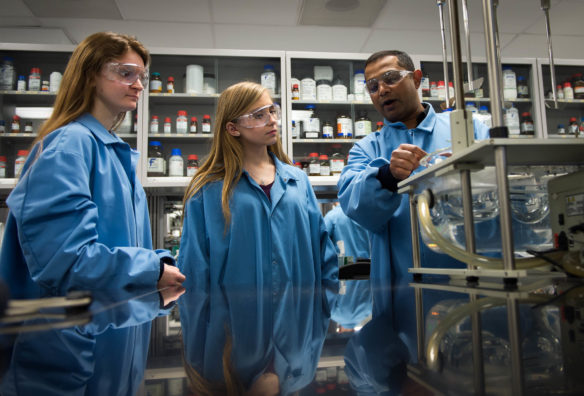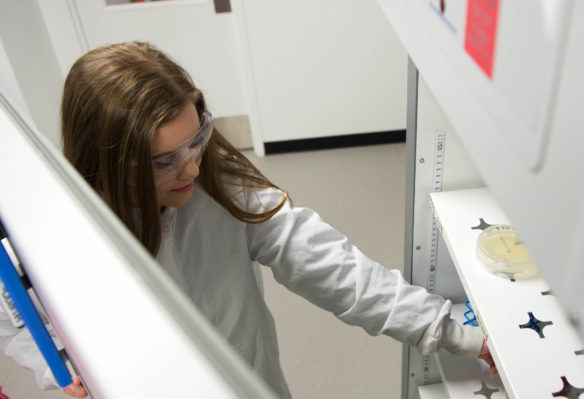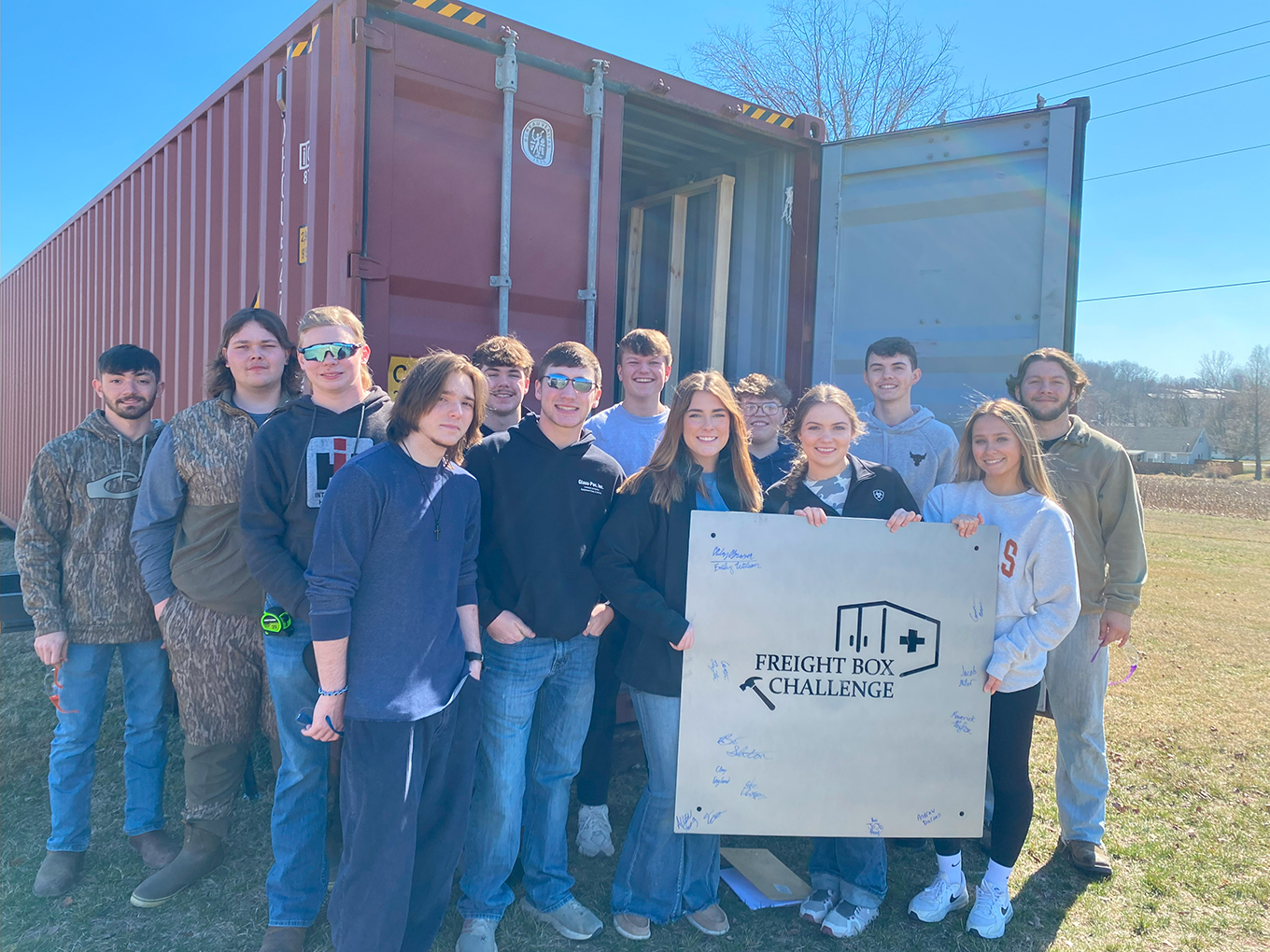
Frances King, from left, and Lindsey Highley, students George Rogers Clark High School (Clark County), are shown a machine used to test medicine by Pavan Dasari during a tour of a laboratory in which they will be working at Catalent Pharma Solutions in Winchester. The students have been hired through the Youth Employment Solutions (YES!) program, through which students can gain real-world experience at businesses that previously might not have been able to hire them.
Photo by Bobby Ellis, Feb. 9, 2017
By Mike Marsee
michael.marsee@education.ky.gov
Opportunity is knocking – on both sides of the door.
A program designed to help both schools and businesses develop a stronger workforce is creating opportunities for students to gain valuable experience at an earlier age. It also is creating opportunities for businesses to cultivate employees who are interested in becoming part of their industry.
The Youth Employment Solutions (YES!) program is making it easier for Kentucky businesses to provide pre-apprentice, co-op and internship opportunities for high school students who might otherwise be ineligible for positions, such as those in manufacturing. A partnership between the Kentucky Department of Education (KDE), the Kentucky Labor Cabinet and Adecco staffing agency, YES! already has placed more than 60 students.
“We want this to create more work-based learning opportunities for students in many different sectors,” said Mary Taylor, an industry training and development specialist in KDE’s Office of Career and Technical Education. “The pipeline is driving the need for schools to think differently about how we place students and for employers to open up their mindset about working with younger students and growing them.”
YES! began as a pilot program in Kentucky a little more than a year ago. According to Adecco, 96 percent of students who have completed the program have gone on to continue their education, extend their time in the program or accept a full-time job offer.
“It’s been going very, very well. Our students have been very successful,” said Megan Bethel, a regional operations manager for Adecco. “From Adecco’s perspective, we are building our future workforce.”
Work-based learning has long been an option for Kentucky students, but child labor laws and worker’s compensation costs have made it prohibitive for many businesses, particularly manufacturers, to hire students younger than 18. That isn’t an issue in YES!, as students are employed by Adecco, which shoulders the responsibility for them.
“It was a continuous barrier in getting students placed who are under 18,” said Taylor, a former career adviser at a career and technical center. “This has been an issue for several years, so we’re glad to have this as an opportunity.”
Removing that barrier also will help grow the Tech Ready Apprentices for Careers in Kentucky (TRACK) youth pre-apprenticeship program, which provides secondary students with career pathway opportunities into Registered Apprenticeship programs.
Adecco offices handle drug testing, background checks and liability, and even help with interview coordination, scheduling and payroll.
“For me, it’s a huge win and it makes it easy on all the shareholders,” said Jason Luring, the human resources director at Catalent Pharma Solutions in Winchester.
Catalent employed three students from George Rogers Clark High School (Clark County) and the Clark County Area Technology Center last year and hired three more George Rogers Clark High students this year through the program.
“Companies have an obligation to be good employers and to be active members of the community,” Luring said. “There are lots of ways to meet work needs and also give students an opportunity to experience the workforce.”
Taylor said students learn much more in a work environment than a teacher or parent could ever tell them.
“It’s an employer telling them what they have to do to be employed. The student needs to know what it is to be an employee. This is a true example of why they have to be at work on time, why they have to be drug-free and so on,” she said.
YES! comes at no cost to schools and districts, which must only sign a memorandum of understanding that Taylor said has been vetted by the legal offices at both KDE and Adecco.
She said the program is open both to students from area technology centers and to those from career and technical education programs at other schools. Students are required to be part of a career pathway related to the field they are entering.
“This is not meant for an employer to supplement a workforce. At a busy time of year, they can’t just call up and say, ‘Hey, I need 50 kids to come.’ This is actually tied to a career pathway,” Taylor said.
The employees who came to Catalent from the YES! program this year are from the four-year biomedical program at George Rogers Clark High. Sarah Brown, who oversees the program that covers more than 50 different careers in science and medical fields, first wanted Luring to meet some of her students and to arrange some job-shadowing at the pharmaceutical company. Luring offered some of the students a chance to come on board after talking to them.
“I think it’s extremely important in our program that students get to experience the highs and lows of each field,” Brown said. “Catalent interviewed the students first, and Adecco did a second interview with them.”
Luring said one of the three YES! employees who worked at Catalent last year stayed on after graduation.

Camille Felts, a senior at George Rogers Clark High School (Clark County), checks an incubator in a laboratory at Catalent Pharma Solutions. Three students from the school’s biomedical career pathway are working at the pharmaceutical company.
Photo by Bobby Ellis, Feb. 9, 2017
“What we saw in last year’s class is that they came in and learned the job, and instead of doing ‘busy work,’ they increasingly got more complex work,” he said. “As they got more developed and trained, they started working more hours because we had work for them to do. It’s a win-win if you have the right students and the right assignment.”
Bethel said students have been placed in a variety of fields, including engineering, welding, carpentry, medical offices and nutrition. Taylor said the program is suitable for all types of employers.
“It’s good for any business, from a large company to a mom-and-pop employer. It covers the whole gamut as far as our program areas,” Taylor said.
Luring said he would encourage other businesses to consider the program as a way to fill its needs with engaged, motivated employees.
“Any employer that has talent needs really ought to seriously look at this program, because Adecco and the YES! program eliminate a lot of challenges of hiring,” he said. “Then it’s really up to the employer and what they need, and when they find good students, put them to work.
“If employers put some thought into it, they will be able to craft an assignment or a set of core job responsibilities where these students get the exposure and they’re actually adding value and doing real work. The student will come out better educated about the workforce and working in industry, and the employer should get just about the same amount of value in terms of their operation.”
Both KDE and Adecco have been promoting the program to schools and employers.
“It’s not really about selling, but more about the educational piece, educating people from the human resources team to plant managers to production floors. Once they are educated, it’s relatively easy to sell the program. And once one person does it in an area, everyone else wants to jump on board,” Bethel said.
The work-based learning model created in Kentucky is part of a national initiative by Adecco Group North America to facilitate 10,000 work-based learning opportunities in the U.S. by 2020.
“Everybody’s looking at Kentucky, including the Department of Labor and the Department of Education, and using this as a best practice,” Bethel said.
MORE INFO …
Megan Bethel megan.searles@adeccona.com
Sarah Brown sarah.brown@clark.kyschools.us
Jason Luring jason.luring@catalent.com
Mary Taylor mary.taylor@education.ky.gov




Leave A Comment